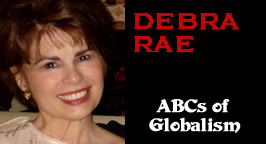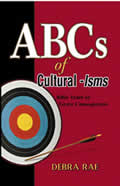SOCIO-POLITICAL
MONKEY BUSINESS
PART 1
By
Debra Rae
January 13, 2013
NewsWithViews.com
Part 1: Institutional Monism
In 1828 Charles Darwin’s father sent him to Christ’s College in Cambridge in hopes of his son’s becoming a clergyman. But Charles had a different idea. He extrapolated that, apart from God, man’s efforts promise to yield a future utopia wherein only the fittest among favored survivors rule.[1]
By identifying the best human specimens for reproduction and, conversely, by isolating and eventually eliminating those human specimens tending to impede or otherwise contaminate the process, Darwin’s brainstorm, natural selection, is really deliberate selection. And who better to select than Darwin and his colleague-cousin Francis Galton—you know, the one who coined the term “eugenics” for “good birth”[2]
Darwin and Galton were wellborn-and-bred British elitists of their day. Although both rejected its democratic elements, the cousins identified with the dark side of the Enlightenment. Some semblance of science suited their common cause, and Darwin’s legendary treatise filled the bill nicely. Enter, On the Origin of Species by Means of Natural Selection, or the Preservation of Favored Races in the Struggle for Life.
Theory or Fact?
To qualify as observable, measurable, repeatable scientific fact, a theory must first withstand the rigors of laboratory testing. Problem is, the origin of a new species from a pre-existing one has never been directly observed (not even once); and then there’s that problematic “missing” link. Barefaced absence of prerequisite transitional species in the fossil record baffled even Darwin, and the British Museum (says fossil expert Dr. Etheridge) is “full of proofs” that Darwin’s theory is “utterly false.”[3]
Australian molecular biologist Dr. Michael Denton argues, “Unguided trial-and-error is unable to reach anything but the most trivial of ends.”[4] Indeed, Italian biologist Francesco Redi and Louis Pasteur soundly debunked Darwin’s theory of spontaneous generation. Even Darwin admitted the ludicrousness of explaining the “existence of a single peacock feather” resulting from some spontaneous, random process. In a letter to Dr. Asa Gray, Darwin further admitted, “Imagination must fill up very wide blanks.” Conversely, naturalists routinely ridicule a so-called “God of the gaps.”[5]
For Darwin’s theory to fly, random genetic changes must provide advantage at every turn in an organism’s struggle to survive. This is not only highly improbable; it’s impossible. Even the evolutionary apologist British zoologist Julian Huxley ceded that a mutation signifies abnormality, not evolutionary advancement. Yet we’re expected to overlook the fact that distinctive human attributes (i.e., language, posture/ gait, moral/ religious sensibilities, art/ music appreciation) are not explicable by variations—i.e., multiple mutations or genetic shuffling. My point? Evolutionary theory is just that: A theory.[6]
Hi-Ho the Dario, the Monkey Stands Alone
Mind you, Darwin hated his time at school and applied himself minimally. He left Edinburgh without a degree; and, at Christ’s College, Cambridge, where he studied theology, he earned what’s characterized as an “ordinary” degree.[7]
Darwin’s body of work was not wholly original, as one might expect. Instead, its “borrowed tenets” were lifted from a poem written by Charles’ grandfather, Dr. Erasmus Darwin. The latter practiced an 18th-century, Frankensteinian pseudo-science (Galvanism) that involved running electrical currents through corpses of dead animals to bring them back to life.[8]
Though Richard Dawkins insists that Darwin's theory is about as much in doubt as "the earth goes around the sun,” reputable colleagues (who, unlike Darwin, did apply themselves in school) disagree. In 1993, a number of intellectually dissatisfied scientists representing a variety of disciplines took a fresh look at Darwinism in light of ever exploding scientific knowledge. What they came up with was irrefutable evidence for Intelligent Design.
De Facto Policy Built on Sand
Predictably, their opponents countered; however, Intelligent Design explains what evolution can’t. Biochemistry professor Michael Behe’s principle of “irreducible complexity” aims for the jugular of Darwinian theory. Behe explains that an irreducibly complex system is one "composed of several well-matched, interacting parts that contribute to the basic function, wherein the removal of any one of the parts causes the system to effectively cease functioning."
The bacterial flagellum, for instance, is a propulsion system, driven by a high-speed motor. Of its forty necessary structural parts, thirty are uniquely essential and, in terms of timing, all must be assembled precisely. Said parts cannot be removed or borrowed (co-opted). This principle likewise applies to the ear, eye, and heart. To work as a proper whole, none could possibly be the product of a slow, evolutionary process.[9]
| Subscribe to the NewsWithViews Daily News Alerts! |
Complexity, coupled with discernable purpose, practically shouts design. In my view, it takes more faith to embrace scientific Darwinism than it does to acknowledge the sovereign Creator of our universe. But this is not my thesis. More to the point, I challenge the theory’s king-of-the-mountain monism. Never mind that modern DNA genetic chromosome research echoes the Genesis account of man’s descent from one mother. Darwinism is accepted as uncontestable fact, not theory. Notwithstanding documented hoaxes and its Unitarian Universalist leaning, scientific evolution stands today as de facto policy.
More to follow in Part 2.
� 2013 Debra Rae - All Rights Reserved
Footnotes:
1.
Charles Darwin’s true claim to fame is this philosophy, called
historic optimism.
2.
Chuck Morse. The Monkey Trial: Evolutionary Politics in the Post-Modern
Age. (Boston: City Metro Enterprises, 2013).
3.
Ibid
4.
Michael Denton. Evolution: A Theory in Crisis (Chevy Chase, MD: Adler
& Adler Publishers, Inc., 1996), 61, 62, 319-324, 347, 348.
5.
(Morse, The Monkey Trial).
6.
John F. Ashton, Ph.D. In Six Days: Why Fifty Scientists Choose to
Believe in Creation (Green Forest, AR: Master Books, Inc., 2001),
Preface 5.
7.
(Denton, Evolution,
A Theory in Crisis, 24) and retrieved 29 January 2013.
8.
(Morse, The Monkey Trial).
9.
Jay Richards. God and Evolution (Seattle: Discovery Institute
Press, 2010), 109, 119, 248, 253, 257.











 Share
This Article
Share
This Article






